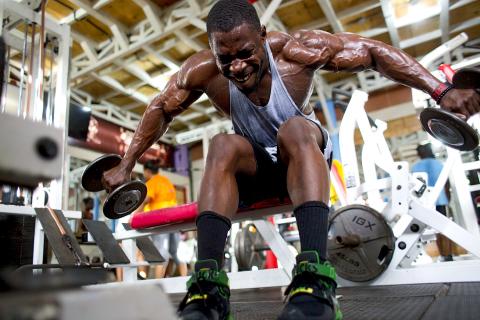Some women may claim that chiseled abs and giant biceps are not what they are seeking in a man. But a scientific study suggests that if your female partner tells you this, she is probably just being kind.
The study, on the subject of male bodily attractiveness, has found that the most Herculean bodies were universally the most appealing, according to the 160 women doing the rating.
“We weren’t surprised that women found physically strong men attractive ... what did surprise us was just how powerful the effect was,” said Aaron Sell, a senior lecturer at Griffith University, Queensland, Australia, who led the work. “Our data couldn’t find even a single woman that preferred weaker or feminine male bodies.”

Photo: AP
The findings run counter to a theory that has been gaining traction in the field of male attractiveness research, that there exists a “sweet spot” for brawn, and that beyond a certain threshold too much strength becomes unappealing.
This view is wrong, the team behind the latest study claim.
Aaron Lukazsweski, an evolutionary psychologist at California State University, said: “The theory is that, yes, there would have been benefits ancestrally, in terms of the ability to acquire resources, protecting offspring, hunting and so on. But at a certain point, mating with highly dominant men, they can exert all this aggressive coercive control and there might be costs.”
The paper, published in the Royal Society journal Proceedings B, highlights the further potential downside that physically formidable men might be “better able to invest resources in a family [but] less willing to do so than weaker men of poorer quality.”
However, the empirical evidence suggests that if there are downsides to being muscular, this fact is not reflected in female preferences.
Lukazsweski said the field appears to have been misled by studies which used line drawings of the male body, rather than photographs.
“Most of the studies have been done using line drawings, which have shown hulk-like freaks of nature, that are at the borderline of looking like a human,” he said.
In the latest study, 160 women were shown photographs of male bodies, with the head blanked out and asked to rate them for attractiveness. One set of photographs showed male university students and a second set showed men recruited from a gym, who worked out between three to five times each week. The men were also given a strength test.
The strength of a man was by far the strongest predictor of whether he was rated as attractive — it explained 70 percent of the difference in scores.
Being tall gave men a small boost of a few percentage points, while being overweight incurred a few negative points.
“Our results suggest that even if you’re a bit overweight, looking strong can buffer that. Basically, being a strong, fat guy is OK, which I think would bring comfort to many.”
The team said they now intend to turn their gaze to the question of why the results differ to studies on facial attractiveness where women have shown a preference for feminine male faces. “It looks like the face is being analyzed differently by women, and we’re not sure why yet,” said Sell.

Taiwan Power Co (Taipower, 台電) and the New Taipei City Government in May last year agreed to allow the activation of a spent fuel storage facility for the Jinshan Nuclear Power Plant in Shihmen District (石門). The deal ended eleven years of legal wrangling. According to the Taipower announcement, the city government engaged in repeated delays, failing to approve water and soil conservation plans. Taipower said at the time that plans for another dry storage facility for the Guosheng Nuclear Power Plant in New Taipei City’s Wanli District (萬里) remained stuck in legal limbo. Later that year an agreement was reached

What does the Taiwan People’s Party (TPP) in the Huang Kuo-chang (黃國昌) era stand for? What sets it apart from their allies, the Chinese Nationalist Party (KMT)? With some shifts in tone and emphasis, the KMT’s stances have not changed significantly since the late 2000s and the era of former president Ma Ying-jeou (馬英九). The Democratic Progressive Party’s (DPP) current platform formed in the mid-2010s under the guidance of Tsai Ing-wen (蔡英文), and current President William Lai (賴清德) campaigned on continuity. Though their ideological stances may be a bit stale, they have the advantage of being broadly understood by the voters.

In a high-rise office building in Taipei’s government district, the primary agency for maintaining links to Thailand’s 108 Yunnan villages — which are home to a population of around 200,000 descendants of the Chinese Nationalist Party (KMT) armies stranded in Thailand following the Chinese Civil War — is the Overseas Community Affairs Council (OCAC). Established in China in 1926, the OCAC was born of a mandate to support Chinese education, culture and economic development in far flung Chinese diaspora communities, which, especially in southeast Asia, had underwritten the military insurgencies against the Qing Dynasty that led to the founding of

Artifacts found at archeological sites in France and Spain along the Bay of Biscay shoreline show that humans have been crafting tools from whale bones since more than 20,000 years ago, illustrating anew the resourcefulness of prehistoric people. The tools, primarily hunting implements such as projectile points, were fashioned from the bones of at least five species of large whales, the researchers said. Bones from sperm whales were the most abundant, followed by fin whales, gray whales, right or bowhead whales — two species indistinguishable with the analytical method used in the study — and blue whales. With seafaring capabilities by humans